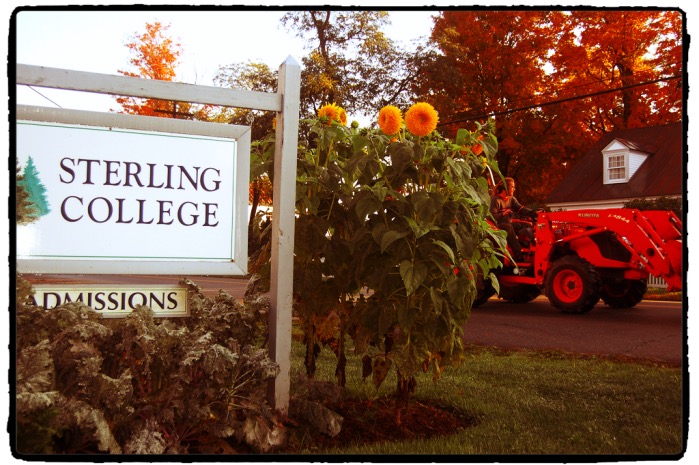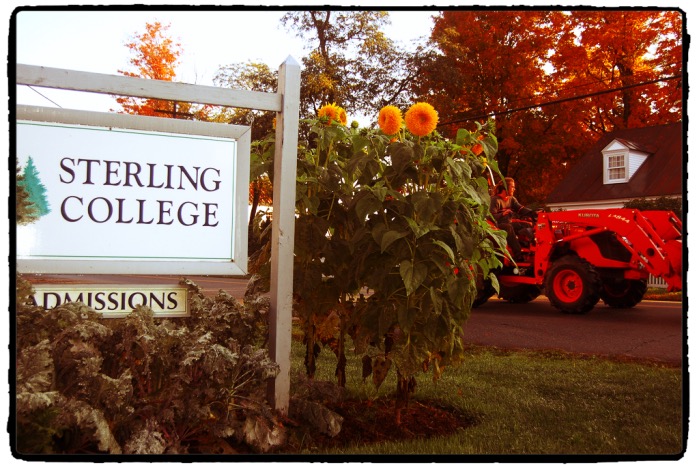CRAFTSBURY COMMON — Sterling College, already known for growing 20 percent of its own food on campus, has been confirmed as the top college in the U.S. that eats food that is local, sustainable, humane, and fair-trade.
This ranking comes from the Real Food Challenge, which surveyed over 160 colleges and universities throughout the U.S.
After reviewing all of the food used in the Sterling College kitchen from June 2013 to June 2014, the college found that 76 percent of its food met the real food qualification for production methods. In comparison, the next-highest ranked institution eats only 34 percent real food.
“This is a significant achievement, and it reinforces that our entire community is invested in solving the biggest issues of the 21st century: our food, our water, our air, and our energy,” said President Matthew Derr. “We have one of the first sustainable agriculture programs in the country, and our students are tackling how to redesign the nation’s food system into one that is just, fair, and doesn’t exacerbate climate change.”
He continued, “We are leaps and bounds ahead of other higher education institutions on this issue because of our long-standing commitment to environmental stewardship and our ecological approach to farming and food systems.”
Students were excited about the findings. Sterling College students work on the on-campus farm and have a significant say in what food is served on campus.
“We keep Sterling special by growing a lot of our own food on campus and by not having vending machines here,” said Jesse Keck. “I was happy to learn that we had raised our real food consumption up from last year’s 73 percent. But being number one in the country shows that we’re not just studying environmental stewardship and sustainable food systems: we’re living it.”
Keck is one of the Food System Analysts for the 2014-15 school year for his Work Program job. “Going forward, we’re going to reach out to the community and see what we can do to improve our numbers even more for next year,” he said.
Simeon Bittman, the Executive Chef for Sterling College, agrees.
“The kitchen at Sterling is different from any kitchen I’ve worked at in my career,” he said. “We produce meals for every dietary need on campus—vegetarian, vegan, and gluten-free, and all delicious. Our students are dedicated to making best use of the food we grow right here on campus and from our neighboring farms. There’s a passion for the entire food cycle here, from seedling to compost.”
Sterling’s Garden Manager, Gwyneth Harris, is pleased by the findings, but not terribly surprised. “At Sterling, we examine everything we do in terms of how it might affect the environment, from how we heat and light our campus to what coffee we use in the dining hall,” she said. “We use our campus as a living laboratory to grow our own food, but we also look at how to grow those crops for a changing climate, and how to feed our community in the best way possible.”
The survey also revealed that Sterling College eats 54 percent local food, meaning food that comes from either large farms within a 150 mile radius of campus, or small farms within a 250 mile radius.
Sterling College’s Rian Fried Center for Sustainable Agriculture & Food Systems has over 130 acres of farm and garden. Students grow crops, manage livestock, and use both tractors and draft horses to power the farm. The Center also includes an edible forest garden, the Alfond Draft Horse Barn, hoop houses, and a sugar house and sugarbush for maple syrup production.
Sterling College’s kitchen is at the center of the community’s life. All students must complete at least one week of dish chores per semester, student cooks work alongside the professional chefs, and Sterling uses no food service company to put out meals for all of the students, faculty, and staff.
The Real Food Challenge is an annual challenge for colleges and universities to have 20 percent real food on campus by 2020. Its goal is to shift $1 billion in institutional food spending to real food.




